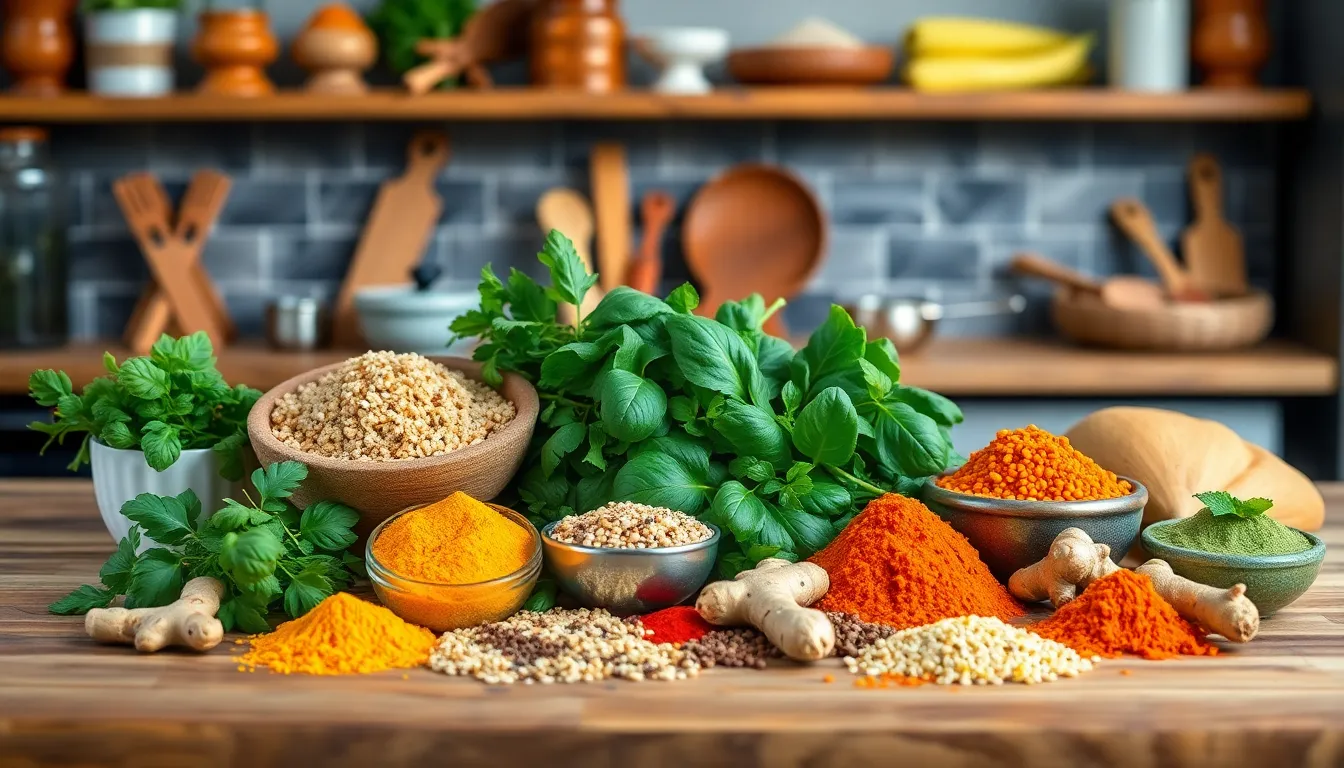Ayurvedic recipes offer a delicious way to embrace holistic health while savoring vibrant flavors. Rooted in ancient Indian traditions, Ayurveda emphasizes balance and harmony between the body, mind, and spirit. By incorporating natural ingredients, these recipes not only nourish the body but also promote overall well-being.
Exploring Ayurvedic cooking opens a world of culinary possibilities. From soothing soups to invigorating spices, each dish is designed to support individual health needs and seasonal changes. Whether someone is new to Ayurveda or looking to deepen their knowledge, these recipes provide a practical approach to integrating wellness into daily life. Get ready to discover how simple ingredients can transform meals into powerful tools for health and vitality.
Table of Contents
ToggleWhat Are Ayurvedic Recipes?
Ayurvedic recipes encompass dishes that promote health and balance through natural ingredients. These recipes derive from Ayurveda, an ancient Indian healing system emphasizing harmony among the body, mind, and spirit.
Ayurvedic cooking emphasizes using fresh, seasonal ingredients, which nourish the body and align with individual dosha types—Vata, Pitta, and Kapha. Each dosha represents different energies and qualities, dictating food selection for optimal health. For example, individuals with a Pitta constitution may prefer cooling foods like cucumbers, while Vata individuals benefit from warm, grounding dishes like cooked grains.
Common components found in Ayurvedic recipes include spices such as turmeric, ginger, and cumin. These spices not only enhance flavor but also provide various health benefits, including anti-inflammatory and digestive properties. Furthermore, Ayurvedic recipes often incorporate a balance of six tastes: sweet, sour, salty, bitter, pungent, and astringent. This balance contributes to overall satisfaction and well-being while addressing individual health needs.
Each recipe serves as a tool for fostering vitality and health, reflecting the holistic approach inherent in Ayurveda. Through mindful cooking and eating practices, individuals can utilize these recipes to support their physical and mental health journey.
Key Ingredients in Ayurvedic Cooking

Ayurvedic cooking emphasizes specific ingredients that promote health and balance. Understanding these key components enhances the cooking experience and aligns meals with individual health needs.
Herbs and Spices
- Turmeric: Contains curcumin, which has anti-inflammatory and antioxidant properties. Turmeric supports digestion and balances Vata and Pitta doshas.
- Ginger: Known for its digestive benefits, ginger aids in alleviating nausea and boosting metabolism. It’s a warming spice that benefits Vata and Kapha.
- Cumin: Enhances digestion and improves metabolic health. Cumin seeds promote nutrient absorption and are beneficial for all doshas.
- Coriander: Helps in detoxifying the body and supporting digestion. Coriander seeds can balance Pitta and Kapha doshas.
- Fenugreek: Contains fiber and aids in lowering blood sugar levels. Fenugreek is also beneficial for Pitta and Kapha.
Grains and Legumes
- Rice: Digestible and soothing for the digestive system, rice is a staple that balances all doshas, especially Kapha.
- Quinoa: A complete protein, quinoa supports muscle growth and is gluten-free. It’s excellent for balancing Vata due to its grounding properties.
- Lentils: Rich in protein and fiber, lentils support digestive health and nourish the body. They can help balance Vata and Pitta doshas.
- Barley: A cooling grain, barley aids in detoxifying the body and stabilizing blood sugar levels. It’s particularly good for Pitta.
Fruits and Vegetables
- Grapes: Hydrating and sweet, grapes support Pitta balance and provide antioxidants that promote overall health.
- Spinach: Rich in vitamins and minerals, spinach promotes detoxification and supports healthy digestion. It’s beneficial for all doshas.
- Carrots: A source of beta-carotene, carrots enhance vision and are sweet, making them suitable for balancing Vata.
- Pumpkin: Nutritious and grounding, pumpkin can help balance Vata with its warm, sweet qualities and fiber content.
- Bananas: Full of potassium and natural sugars, bananas provide energy and are beneficial for Pitta balance.
By incorporating these herbs, spices, grains, legumes, fruits, and vegetables, Ayurvedic cooking not only nourishes but also supports holistic well-being.
Popular Ayurvedic Recipes
Ayurvedic recipes cater to diverse preferences while promoting health through balanced meals. Below are several options organized into categories for easy exploration.
Breakfast Options
- Herbal Oatmeal: Combine rolled oats with water or almond milk, add fresh fruits like bananas or apples, and top with a sprinkle of cinnamon and cardamom for added flavor and benefits.
- Spiced Quinoa: Cook quinoa in vegetable broth and mix in chopped vegetables like kale or spinach. Season with turmeric, cumin, and black pepper for enhanced health benefits.
- Warm Ginger Tea: Boil fresh ginger slices in water and steep for 10 minutes. Add honey and lemon for taste, promoting digestion and revitalization.
Lunch and Dinner Recipes
- Kitchari: Blend basmati rice and split mung beans with spices like cumin and mustard seeds. Cook with ghee and seasonal vegetables, creating a nourishing one-pot meal for detoxification.
- Vegetable Curry: Sauté seasonal vegetables with onions, garlic, and ginger. Add coconut milk and spices like coriander and turmeric for flavor and anti-inflammatory properties.
- Lentil Soup: Simmer lentils with diced tomatoes, carrots, and celery. Season with turmeric and cumin for flavor, while providing protein and fiber.
Wellness Beverages
- Turmeric Milk: Heat milk (or plant-based alternatives) and stir in turmeric, black pepper, and honey. This beverage promotes anti-inflammatory benefits and relaxation.
- Amla Juice: Mix fresh amla fruit or powder with water and honey. Amla is rich in vitamin C and beneficial for immune health.
- Spiced Chai: Brew black tea with spices like cardamom, cinnamon, and ginger. Serve with milk for a warm beverage that enhances digestion and boosts energy.
Health Benefits of Ayurvedic Recipes
Ayurvedic recipes deliver numerous health benefits that support physical and mental well-being. They promote balance by addressing individual dosha types, ensuring that the body’s unique needs are met. This balance can lead to improved digestion, increased energy levels, and enhanced immunity.
Nutritional Advantages
- Rich in Nutrients: Ayurvedic recipes incorporate a variety of fruits, vegetables, and whole grains that provide essential vitamins and minerals.
- Balanced Diet: They encourage a diversity of tastes and nutrients, contributing to overall well-being and satisfaction.
Digestive Health
- Digestive Spices: Ingredients like ginger and cumin aid in digestion, reducing bloating and discomfort.
- Herbal Remedies: Recipes like spiced quinoa or kitchari include herbs known for their digestive properties, facilitating a healthy gut.
Anti-Inflammatory Effects
- Turmeric Benefits: Turmeric’s active compound, curcumin, is linked to reduced inflammation and better joint health.
- Ginger Influence: Ginger also has anti-inflammatory properties, which can alleviate pain and swelling.
Enhanced Mental Clarity
- Holistic Ingredients: Foods rich in antioxidants support brain health, potentially improving memory and cognitive function.
- Mindful Eating: Ayurvedic practices promote mindfulness, allowing individuals to connect with their food and eat with intention, thereby enhancing mental clarity.
Immune Support
- Natural Immunity Boosters: Ingredients like garlic and amla contain antioxidants that bolster the immune system.
- Seasonal Variations: Cooking with seasonal ingredients ensures consistent nutrient intake, aligning health with environmental cycles.
Energy and Vitality
- Whole Food Choices: Incorporating whole grains, legumes, and seasonal produce sustains energy levels throughout the day.
- Balanced Portions: Recipes emphasize the importance of portion control, reducing fatigue caused by overeating.
By embracing Ayurvedic recipes, individuals can integrate these health benefits into their daily routines, enhancing overall vitality and promoting a holistic approach to health.
Tips for Cooking Ayurvedic Meals
- Choose seasonal ingredients: Freshness boosts nutrient content and flavor, aligning meals with the natural cycles of nature.
- Balance the six tastes: Incorporate sweet, sour, salty, bitter, pungent, and astringent flavors for a satisfying meal that nourishes both body and mind.
- Tailor meals to dosha types: Identify whether the individual is Vata, Pitta, or Kapha, and customize meals to address specific needs. For instance, Vata types benefit from grounding, warming foods, while Pitta types require cooling options.
- Incorporate herbs and spices: Utilize spices like turmeric, ginger, and cumin for their health benefits. These spices not only enhance flavor but also support digestion and overall well-being.
- Practice mindful cooking: Approach the cooking process with awareness and intention. Focus on the task, appreciating the ingredients and their properties to cultivate a connection to food.
- Use cooking techniques that enhance digestion: Techniques such as steaming or sautéing with ghee promote easier digestion and the absorption of nutrients.
- Monitor portion sizes: Eating in moderation aids digestion and prevents imbalances. Consider the individual’s appetite and activity level when serving meals.
- Stay hydrated: Drink warm water or herbal teas throughout the day to maintain hydration, especially when consuming drier foods.
- Include texture variety: Incorporate a mix of textures—crunchy, soft, creamy, and fibrous—to make meals more enjoyable and stimulating.
- Serve meals at the right temperature: Aim to serve food warm but not excessively hot, as this promotes better digestion and satisfaction.
By following these tips, individuals can create Ayurvedic meals that nourish the body while aligning with the principles of holistic health.
Embracing Ayurvedic recipes offers a pathway to holistic health that resonates with ancient wisdom. By focusing on balance among the body, mind, and spirit, individuals can transform their meals into powerful tools for well-being. The use of fresh, seasonal ingredients tailored to specific dosha types ensures that each dish not only nourishes but also aligns with personal health needs.
Incorporating key spices and herbs enhances the nutritional value while providing essential health benefits. As individuals explore these recipes, they’ll discover the joy of mindful cooking and eating, leading to improved digestion, increased energy, and enhanced immunity. Ayurvedic cooking is not just about food; it’s a lifestyle choice that promotes vitality and harmony.





